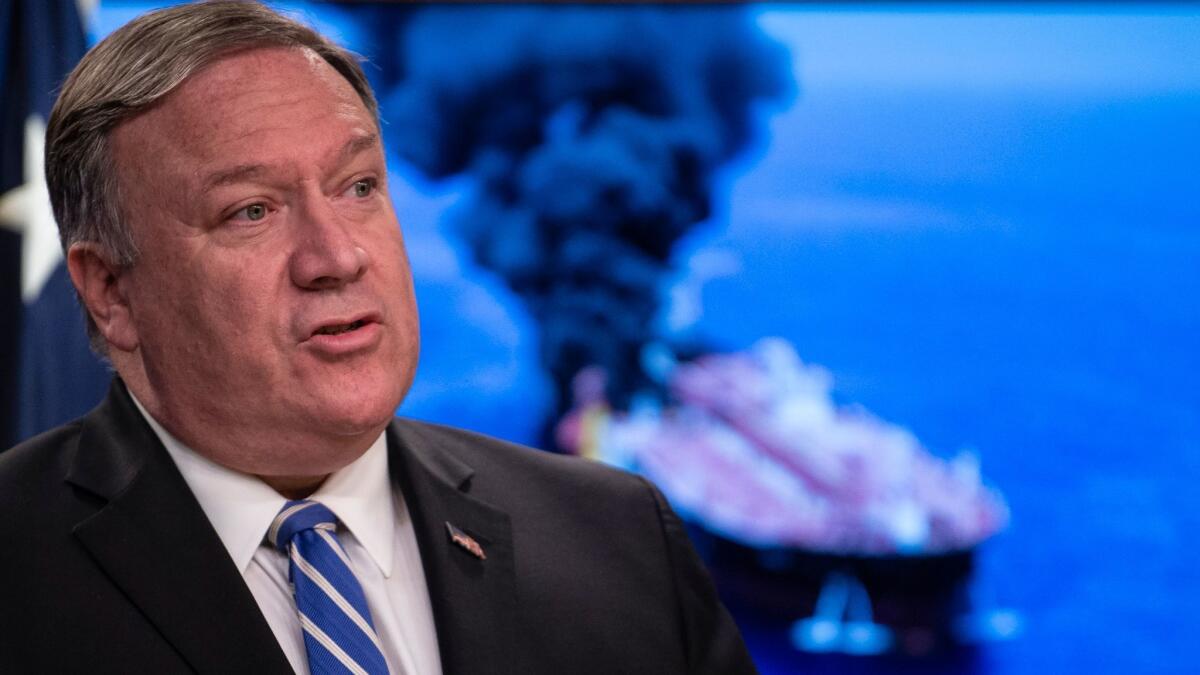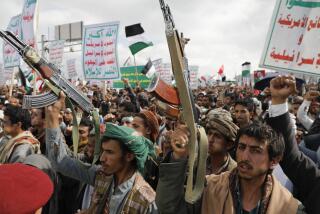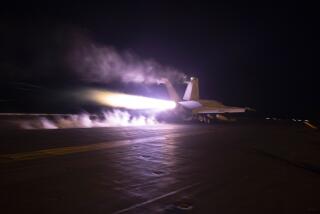Pentagon accuses Iran of shooting missiles at U.S. drones

The Pentagon on Sunday accused Iran of attempting to shoot down a U.S. Reaper drone on June 13 as the unmanned surveillance aircraft was flying over one of two crippled tankers in the Gulf of Oman.
U.S. military officials for the first time also linked Iran to a separate missile attack in Yemen on June 6 that hit another Reaper drone and forced it to crash.
The U.S. blamed Tehran-backed Houthi rebels fighting in the country’s civil war, citing unspecified “Iranian assistance” in the missile launch.
The Pentagon released no video or other evidence of Iran’s involvement, and did not explain why it waited so many days before announcing the attacks, which caused no injuries.
But the decision to publicly blame Iran for them increased chances that President Trump will boost U.S. forces in the Middle East or take other steps to intensify what the White House calls a “maximum pressure” campaign against Tehran.
Lt. Col. Earl Brown, a spokesman for U.S. Central Command, said a U.S. intelligence assessment had concluded that “a modified Iranian SA-7 surface-to-air missile attempted to shoot down a U.S. MQ-9 [drone] over the Gulf of Oman to disrupt surveillance” of the crippled tanker.
The Russian-designed, shoulder-fired, anti-aircraft missile missed by about a kilometer, or more than half a mile, Brown said.
Tensions flared last week after the Trump administration publicly blamed Iran for what it said were coordinated attacks on a pair of fuel tankers, owned by companies in Japan and Norway, in international waters.
Both ships suffered still-unexplained explosions shortly after dawn Wednesday and caught fire, forcing the crews to evacuate. Iran denied any role.
In the second incident, Brown said a U.S. MQ-9 Reaper was shot down over Yemen a week earlier “by what we assess to be a Houthi SA-6 surface-to-air missile.”
While Trump went golfing on Sunday, his advisors appeared on TV talk shows to point the finger at Iran and warn of possible action.
The president and his national security advisors are weighing “a full range of options” against Iran, including military moves, Secretary of State Michael R. Pompeo said on “Fox News Sunday.” “We are confident that we can take a set of actions that can restore deterrence.”
Pompeo declared that Iranian involvement in the tanker explosions was “unmistakable.”
“These were attacks by the Islamic Republic of Iran on commercial shipping, on the freedom of navigation with the clear intent to deny transit” through the Strait of Hormuz, Pompeo said. Much of the world’s oil passes through the narrow waterway.
Iranian forces fired a modified SA-7 surface-to-air missile at a U.S. Reaper at 6:45 a.m. on June 13, minutes after the drone had arrived in the vicinity of the two crippled tankers, according to Capt. Bill Urban, a spokesman for U.S. Central Command, which oversees U.S. military operations in the Middle East.
“Subsequent analysis indicates that this was a likely attempt to shoot down or otherwise disrupt the [drone] surveillance” of the stricken tankers, Urban said. He blamed the launch on the Iranian Revolutionary Guard Corps, a paramilitary organization.
“The SA-7 was ineffective and its closest point of approach to the MQ-9 was approximately one kilometer,” Brown said.
The command released no video or other evidence to back up the claim that an attempted missile attack had occurred.
The attack a week earlier hit a Reaper flying over Yemen and caused it to crash, officials said.
Video released by Houthi rebels and posted on YouTube purportedly showed wreckage of aircraft on the ground in Yemen, including shots of a propeller like those on a Reaper drone.
U.S. officials said Sunday that the Reaper appeared to have been hit by an SA-6 missile, a Russian-designed anti-aircraft system, typically fired from a mobile launcher.
The missile strike occurred at too high an altitude for Houthi rebels with the anti-aircraft missiles known to be in their possession, indicating that they had received assistance from Iran, U.S. officials said.
“The altitude of the engagement indicated an improvement over previous Houthi capability, which we asses was enabled by Iranian assistance,” Urban said.
The Trump administration has kept up a drumbeat of accusations against Iran for the last month, insisting that it had intelligence information suggesting the Revolutionary Guard was preparing for attacks against the U.S. or its allies in the region.
On Thursday, Central Command made public video taken by a U.S. surveillance aircraft that it said showed Revolutionary Guard personnel on a small patrol boat removing an unexploded mine from the hull of one of the damaged tankers.
The grainy black and white video shows a small boat beside the tanker. Several crew members are clustered near the bow and one appears to be pulling a small device off the hull.
Appearing on CBS’ “Face the Nation,” Pompeo dismissed skepticism from Germany and several other countries about whether the video proved Iranian involvement in the earlier explosions.
Pointing to “lots of data, lots of evidence” supporting the Trump administration’s accusations against Iran, he said the United States would use means “diplomatic and otherwise” to guarantee unimpeded shipping.
Democrat lawmakers and presidential candidates warned that hawkish figures in Trump’s inner circle, including Pompeo and national security advisor John Bolton, might push the country into war.
Pete Buttigieg, one of 23 candidates in the race, said the week’s events appeared “part of an escalation where this administration might be leading us on a path to war.”
He cited a pattern of “malignant” behavior by Iran but urged stepped-up consultations with allies.“The question is: What are we going to do to make things more stable before the situation becomes uncontrollable?” said Buttigieg.
U.S. officials had disclosed the attacks in recent days, but the Central Command statement Sunday was the first public effort to blame Iran for them.
More to Read
Get the L.A. Times Politics newsletter
Deeply reported insights into legislation, politics and policy from Sacramento, Washington and beyond. In your inbox three times per week.
You may occasionally receive promotional content from the Los Angeles Times.






